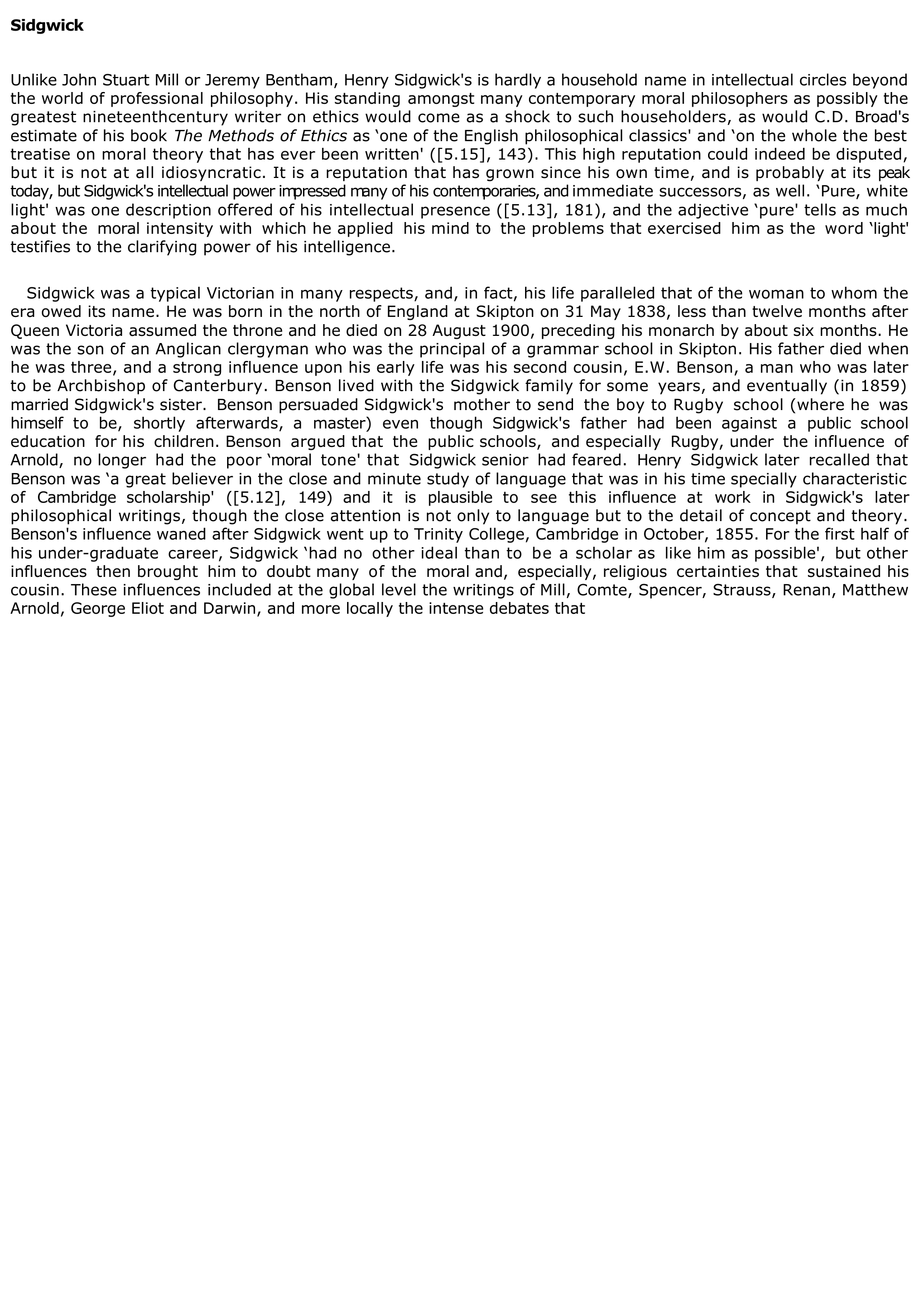Encyclopedia of Philosophy: Sidgwick
Extrait du document
Unlike John Stuart Mill or Jeremy Bentham, Henry Sidgwick’s is hardly a household name in intellectual circles beyond the world of professional philosophy. His standing amongst many contemporary moral philosophers as possibly the greatest nineteenthcentury writer on ethics would come as a shock to such householders, as would C.D. Broad’s estimate of his book The Methods of Ethics as ‘one of the English philosophical classics’ and ‘on the whole the best treatise on moral theory that has ever been written’ ([5.15], 143). This high reputation could indeed be disputed, but it is not at all idiosyncratic. It is a reputation that has grown since his own time, and is probably at its peak today, but Sidgwick’s intellectual power impressed many of his contemporaries, and immediate successors, as well. ‘Pure, white light’ was one description offered of his intellectual presence ([5.13], 181), and the adjective ‘pure’ tells as much about the moral intensity with which he applied his mind to the problems that exercised him as the word ‘light’ testifies to the clarifying power of his intelligence.
«
Sidgwick
Unlike John Stuart Mill or Jeremy Bentham, Henry Sidgwick's is hardly a household name in intellectual circles beyond
the world of professional philosophy.
His standing amongst many contemporary moral philosophers as possibly the
greatest nineteenthcentury writer on ethics would come as a shock to such householders, as would C.D.
Broad's
estimate of his book The Methods of Ethics as ‘one of the English philosophical classics' and ‘on the whole the best
treatise on moral theory that has ever been written' ([5.15], 143).
This high reputation could indeed be disputed,
but it is not at all idiosyncratic.
It is a reputation that has grown since his own time, and is probably at its peak
today, but Sidgwick's intellectual power impressed many of his contemporaries, and immediate successors, as well.
‘Pure, white
light' was one description offered of his intellectual presence ([5.13], 181), and the adjective ‘pure' tells as much
about the moral intensity with which he applied his mind to the problems that exercised him as the word ‘light'
testifies to the clarifying power of his intelligence.
Sidgwick was a typical Victorian in many respects, and, in fact, his life paralleled that of the woman to whom the
era owed its name.
He was born in the north of England at Skipton on 31 May 1838, less than twelve months after
Queen Victoria assumed the throne and he died on 28 August 1900, preceding his monarch by about six months.
He
was the son of an Anglican clergyman who was the principal of a grammar school in Skipton.
His father died when
he was three, and a strong influence upon his early life was his second cousin, E.W.
Benson, a man who was later
to be Archbishop of Canterbury.
Benson lived with the Sidgwick family for some years, and eventually (in 1859)
married Sidgwick's sister.
Benson persuaded Sidgwick's mother to send the boy to Rugby school (where he was
himself to be, shortly afterwards, a master) even though Sidgwick's father had been against a public school
education for his children.
Benson argued that the public schools, and especially Rugby, under the influence of
Arnold, no longer had the poor ‘moral tone' that Sidgwick senior had feared.
Henry Sidgwick later recalled that
Benson was ‘a great believer in the close and minute study of language that was in his time specially characteristic
of Cambridge scholarship' ([5.12], 149) and it is plausible to see this influence at work in Sidgwick's later
philosophical writings, though the close attention is not only to language but to the detail of concept and theory.
Benson's influence waned after Sidgwick went up to Trinity College, Cambridge in October, 1855.
For the first half of
his under-graduate career, Sidgwick ‘had no other ideal than to be a scholar as like him as possible', but other
influences then brought him to doubt many of the moral and, especially, religious certainties that sustained his
cousin.
These influences included at the global level the writings of Mill, Comte, Spencer, Strauss, Renan, Matthew
Arnold, George Eliot and Darwin, and more locally the intense debates that.
»
↓↓↓ APERÇU DU DOCUMENT ↓↓↓
Liens utiles
- Encyclopedia of Philosophy: Bentham and James Mill
- Encyclopedia of Philosophy: THE CRito of Plato
- Encyclopedia of Philosophy: Albert the Great
- Encyclopedia of Philosophy: Alexander of Aphrodisias
- Encyclopedia of Philosophy: THE THEORY OF IDEAS of PLATO

































